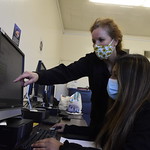Department of Food Science and Nutrition
Human Nutritional Sciences
Background
The Dietetics and Food Administration Option of the Bachelor of Science in Human Nutritional Sciences is an accredited Didactic Program in Dietetics that provides a wide range of learning experiences related to general nutrition, community nutrition, medical nutrition therapy, foods, and food service management.
Fresno is located in the Central Valley and San Joaquin of California, which stretches from Sacramento in the north to Bakersfield in the south and is bordered by the Sierra Nevada Mountains. The service area for Fresno State University is the Central Valley and San Joaquin Valley. As of 2021, Fresno County, contained within the Central Valley, has 984,521 people in its population.
Fresno County, California is the 10th largest County in California. The ethnic mix of the area consists of Caucasian, Hispanic, Asian Pacific, African American, and Native American and other. The service area for Fresno State University is the Central Valley and San Joaquin Valley with an estimated population of 4.3 million people. The Counties in the service area include Fresno, Kern Kings, Madera, Mariposa, Merced, Monterey, San Benito, San Joaquin, San Luis Obispo, Santa Barbara, Santa Cruz, Stanislaus, Tulare and Tuolumne. The ethnic mix of these areas are as follows: 54.9% Hispanic or Latino, 18.2% White, 12.2% Asian, 2.7% Two or more races, 2.8% Black or African American, 0.403% American Indian or Alaska Native, 0.2% Native Hawaiian or other Pacific Islanders, and 3.8% unknown. It is ideally located for offering dietetics education programs.
The unique food and Nutritional needs of the San Joaquin Valley are found in the diversity of the population. Overweight and obesity are strongly tied to many cardiometabolic diseases, leading to major causes of death. According to the data provided by the San Joaquin County Community Health Needs Assessment, there are approximately 76.6% adults either overweight or obese as compared to 62.5% in California. Approximately 21% of youth are overweight or obese as compared to 19% in California and finally, approximately 47% of adults have prediabetes or diabetes.
The combination of both obesity and diabetes mellitus in the San Joaquin Valley is a major health concern amongst medical professionals including physicians, certified diabetes care and education specialists and registered dietitian Nutritionists. There are many unique challenges for Nutrition care providers. Including the DPD program at Fresno State University allows for the continuity of Nutrition care providers to address the overwhelming cardiometabolic health needs in the Central Valley and San Joaquin Valley.
Fresno State University Enrollment
Fresno State enrolls more than 24,000 students and offers 68 baccalaureate degree programs, concentrated into 63 majors within 25 broad fields of study and 58 graduate programs – 45 masters, 7 doctorate and 6 post-bachelors.
Jordan College
The Jordan College of Agricultural Sciences and Technology (Jordan College) is one of eight colleges / schools at Fresno State. The Department of Food Science and Nutrition is one of six departments in The Jordan College. The University has offered a Didactic Program in Dietetics since 1940, beginning with the undergraduate degree program.
The University has offered a dietetics curriculum since 1940, beginning with the undergraduate degree program. The program served as a pilot for the Plan IV requirements in 1973. In 1984, the program was again approved as a Plan IV program. In 1989, the program was approved as a Plan V program. In December 1997, the University submitted an application for a dietetic internship with a general emphasis. In May, 1998, the Commission on Accreditation for Dietetics Education (CADE) of the American Dietetic Association (ADA) granted the program developmental accreditation. The first class of ten students was admitted in August 1998. The fifth internship class graduated in May, 2003. The internship was simultaneously approved on campus as the Certificate of Advanced Study – Dietetics, a post-baccalaureate, non-degree, and certificate program. In 1999, the program was granted developmental accreditation status by the American Dietetic Association (now known as the Academy of Nutrition and Dietetics) as a didactic program in dietetics (DPD).

